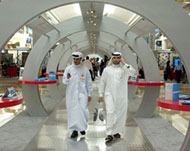Dubai to launch international bourse
This week’s opening of an international stock exchange in Dubai marks another step towards its goal to become the global financial hub between Hong Kong and Frankfurt.

The Dubai International Financial Exchange, or DIFX, starts trading at 2pm (1000 GMT) on Monday with a modest listing of five stock index certificates tracking major European, Japanese and US markets.
It will be a subdued beginning by this wealthy emirate’s standards.
“In Dubai, there’s always a tendency to have fireworks at grand openings,” DIFX chairman Lynton Jones said.
But the veteran Nasdaq executive and former chief of the International Petroleum Exchange admitted “there will be no financial or real fireworks here on day one”.
The fireworks could begin by next month, however.
IPO mania
A regional telecom company, Lebanon’s Investcom, has announced it will be the first company listed on the DIFX, offering shares to the world’s investors in an initial public offering next month.
Recent IPOs in Dubai and other Gulf states have been hugely oversubscribed, with shares rocketing to absurd values.
The Economy Ministry cancelled several planned offerings until regulations could be updated.
On Sunday, tens of thousands of Saudi investors crossed the border to participate in a natural gas producer’s IPO.
|
“If we launch the market with an exciting IPO on day one, we’d be inviting the sort of frenzied activity that takes place in this part of the world during those events. We don’t want that” DIFX chairman Lynton Jones |
Crowds of investors clashed with police when banks could not accommodate share demand.
With the world’s big stock markets providing lacklustre returns, the new Dubai bourse, with headquarters in a futuristic steel-and-glass Arc de Triomphe, could attract intense global interest.
Realising this, Jones said the DIFX is testing its computer trading system by first issuing sedate index certificates, which can be monitored because they are traded elsewhere.
“If we launch the market with an exciting IPO on day one, we’d be inviting the sort of frenzied activity that takes place in this part of the world during those events,” he said.
“We don’t want that. We want to behave responsibly and make sure the whole thing works.”
Target companies
But Jones and Dubai’s ruling shaikhs hope the market will attract small and medium-sized foreign companies from the United Arab Emirates and beyond to list shares in Dubai, with the promise of strict market regulation and oil-rich Gulf Arab investors.
Small, newer companies are expected to be the easiest to recruit.
“In London or New York they are small fish in a big pond,” Jones said. “Dubai is an intermediate environment. They become bigger fish and they still have access to the international investor.”
DIFX has opened listing talks with about 200 companies in the Middle East, India, South Africa and China, Jones said.
 |
|
The bourse has its headquarters |
By the end of the year, Jones hopes to have close to 20 firms listed, through IPOs.
Previous reports have valued those offerings at between $50 million and $1 billion.
Some future listings, like those of Chinese companies, will be exclusive to the DIFX. Others, like those in South Africa and India, will be secondary to listings on home bourses, he said.
By contrast, most Middle Eastern stock exchanges, including the other two in the UAE, list only local companies while restricting foreign ownership of shares and international banks from becoming brokers or members.
Nasdaq characteristics
The DIFX borrows characteristics from New York’s Nasdaq exchange, quoting shares in US dollars and existing solely as a computer network without a trading floor.
For now, the DIFX will buy and sell shares for only three hours a day, between 2pm and 5pm local time (1000 and 1300 GMT).
And, like the world’s biggest exchanges, the DIFX promises transparency and strict regulation, in contrast to freewheeling local bourses with scant disclosure requirements.
The Dubai exchange stands to benefit from surging demand for Islamic financial products – bonds, debt instruments and, perhaps, future stocks that comply with sharia law, Jones said.
The market will also offer international investors access to exchange-traded funds that track the currently red-hot Middle Eastern markets, Jones said.
At launch, the DIFX is to carry only index certificates, issued by Deutsche Bank, that track the US Standard & Poor’s 500 Index, Japan’s Nikkei 225, Europe’s blue-chip Dow Jones STOXX 50 and EURO STOXX 50, and Germany’s DAX.